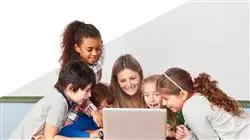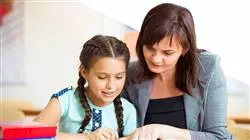University certificate
The world's largest faculty of education”
Introduction to the Program
In only 600 hours, you will become a reference in teaching thanks to this program of TECH Global University”

Many of today's school students are accustomed to learning methods that are old, basic and, in short, almost obsolete. As time goes by, pedagogical models improve, change and grow with society, in one way or another they are alive. This is where the validity of the professional educator comes in, to know how to adapt to these changes, acquire new knowledge and put it into practice to be able to teach in the best possible way.
In the world of education, for example, keeping abreast of the latest pedagogical research, new activities applied to the classroom such as dialogic theories or new technologies in the educational world, as well as the different ways of understanding the student body as a group of learners, is essential for an effective coexistence in a classroom This is why TECH has created this program in Active Pedagogies, focused on educators understanding and applying new ways of teaching, with concepts, theories and modern practices that make teaching a feedback process between student and instructor.
With this in mind, the program will begin by explaining in detail the importance of personalized learning, how to adapt to different student profiles in the classroom, after which it will continue through a module where the theoretical and practical contents of pedagogies such as Montessori or Reggio Emilia will be discussed, which are based on students acquiring knowledge through observation and experimentation, thus achieving a more dynamic and less monotonous education.
With this structure, TECH has created a complete program in Active Pedagogies, but at the same time limited to the subject to be treated, with a flexible character, and adaptable to any student who needs to combine their day-to-day professional life with the Postgraduate diploma. In addition, all modules will be taken online, being able to access the practical and theoretical content from any electronic device with internet access, and, as if that were not enough, the entire program is based on the Relearning method, with which graduates will acquire all the knowledge and skills gradually.
Thanks to this Postgraduate diploma, graduates will understand and be able to apply the key concepts to achieve a personalized and quality education”
This Postgraduate diploma in Active Pedagogies contains the most complete and up-to-date educational program on the market. The most important features include:
- Development of case studies presented by experts in Active Pedagogies
- The graphic, schematic and practical contents of the program provide theoretical and practical information on those disciplines that are essential for professional practice
- Practical exercises where the self-assessment process can be carried out to improve learning
- Its special emphasis on innovative methodologies
- Theoretical lessons, questions to the expert, debate forums on controversial topics, and individual reflection assignments
- Content that is accessible from any fixed or portable device with an Internet connection
Education is alive, and as a teaching professional you must know how to adapt to changes in order to be up to date and offer quality education”
The program’s teaching staff includes professionals from sector who contribute their work experience to this program, as well as renowned specialists from leading societies and prestigious universities.
Its multimedia content, developed with the latest educational technology, will provide the professional with situated and contextual learning, i.e., a simulated environment that will provide an immersive education programmed to learn in real situations.
The design of this program focuses on Problem-Based Learning, by means of which the professionals must try to solve the different professional practice situations that are presented throughout the program. For this purpose, the student will be assisted by an innovative interactive video system created by renowned experts.
Do you know what Homeschooling is? Thanks to this Postgraduate diploma, you will delve into the theory behind the term and especially into how to apply it in your classroom"

Learn all about the different teaching methods, from the Waldorf school to the Feggio and Montessori schools"
Why study at TECH?
TECH is the world’s largest online university. With an impressive catalog of more than 14,000 university programs available in 11 languages, it is positioned as a leader in employability, with a 99% job placement rate. In addition, it relies on an enormous faculty of more than 6,000 professors of the highest international renown.

Study at the world's largest online university and guarantee your professional success. The future starts at TECH”
The world’s best online university according to FORBES
The prestigious Forbes magazine, specialized in business and finance, has highlighted TECH as “the world's best online university” This is what they have recently stated in an article in their digital edition in which they echo the success story of this institution, “thanks to the academic offer it provides, the selection of its teaching staff, and an innovative learning method aimed at educating the professionals of the future”
A revolutionary study method, a cutting-edge faculty and a practical focus: the key to TECH's success.
The most complete study plans on the university scene
TECH offers the most complete study plans on the university scene, with syllabuses that cover fundamental concepts and, at the same time, the main scientific advances in their specific scientific areas. In addition, these programs are continuously being updated to guarantee students the academic vanguard and the most in-demand professional skills. In this way, the university's qualifications provide its graduates with a significant advantage to propel their careers to success.
TECH offers the most comprehensive and intensive study plans on the current university scene.
A world-class teaching staff
TECH's teaching staff is made up of more than 6,000 professors with the highest international recognition. Professors, researchers and top executives of multinational companies, including Isaiah Covington, performance coach of the Boston Celtics; Magda Romanska, principal investigator at Harvard MetaLAB; Ignacio Wistumba, chairman of the department of translational molecular pathology at MD Anderson Cancer Center; and D.W. Pine, creative director of TIME magazine, among others.
Internationally renowned experts, specialized in different branches of Health, Technology, Communication and Business, form part of the TECH faculty.
A unique learning method
TECH is the first university to use Relearning in all its programs. It is the best online learning methodology, accredited with international teaching quality certifications, provided by prestigious educational agencies. In addition, this disruptive educational model is complemented with the “Case Method”, thereby setting up a unique online teaching strategy. Innovative teaching resources are also implemented, including detailed videos, infographics and interactive summaries.
TECH combines Relearning and the Case Method in all its university programs to guarantee excellent theoretical and practical learning, studying whenever and wherever you want.
The world's largest online university
TECH is the world’s largest online university. We are the largest educational institution, with the best and widest online educational catalog, one hundred percent online and covering the vast majority of areas of knowledge. We offer a large selection of our own degrees and accredited online undergraduate and postgraduate degrees. In total, more than 14,000 university degrees, in eleven different languages, make us the largest educational largest in the world.
TECH has the world's most extensive catalog of academic and official programs, available in more than 11 languages.
Google Premier Partner
The American technology giant has awarded TECH the Google Google Premier Partner badge. This award, which is only available to 3% of the world's companies, highlights the efficient, flexible and tailored experience that this university provides to students. The recognition as a Google Premier Partner not only accredits the maximum rigor, performance and investment in TECH's digital infrastructures, but also places this university as one of the world's leading technology companies.
Google has positioned TECH in the top 3% of the world's most important technology companies by awarding it its Google Premier Partner badge.
The official online university of the NBA
TECH is the official online university of the NBA. Thanks to our agreement with the biggest league in basketball, we offer our students exclusive university programs, as well as a wide variety of educational resources focused on the business of the league and other areas of the sports industry. Each program is made up of a uniquely designed syllabus and features exceptional guest hosts: professionals with a distinguished sports background who will offer their expertise on the most relevant topics.
TECH has been selected by the NBA, the world's top basketball league, as its official online university.
The top-rated university by its students
Students have positioned TECH as the world's top-rated university on the main review websites, with a highest rating of 4.9 out of 5, obtained from more than 1,000 reviews. These results consolidate TECH as the benchmark university institution at an international level, reflecting the excellence and positive impact of its educational model.” reflecting the excellence and positive impact of its educational model.”
TECH is the world’s top-rated university by its students.
Leaders in employability
TECH has managed to become the leading university in employability. 99% of its students obtain jobs in the academic field they have studied, within one year of completing any of the university's programs. A similar number achieve immediate career enhancement. All this thanks to a study methodology that bases its effectiveness on the acquisition of practical skills, which are absolutely necessary for professional development.
99% of TECH graduates find a job within a year of completing their studies.
Postgraduate Diploma in Active Pedagogies
The understanding of the world has undergone a significant change and, therefore, Teaching has become a living element that evolves with the society where it is applied. Students are no longer mere recipients of information, but play a more proactive role in their own learning. With this in mind, TECH has created a Postgraduate Diploma in Active Pedagogies focused on this typology of pedagogies, the use of dialogue as a learning tool and the importance of Homeschooling in modern Education. This study plan is taught completely online and students can access the contents from any device with an Internet connection, without time restrictions. In this way, the educational format is completely flexible and adaptable to the needs of each student.
Design the most dynamic educational methodologies thanks to TECH
In the world of education, it is essential to be aware of the latest pedagogical research, new activities applied to the classroom, dialogic theories, emerging technologies in the educational world or the different ways of understanding students as unique individuals. These are elements that, undoubtedly, achieve an effective coexistence in the classroom. To this end, TECH has created a Postgraduate Diploma in Active Pedagogies for educators to apply new ways of teaching through modern concepts, theories and practices that make learning a feedback process between student and instructor. Therefore, the program begins by explaining in detail the importance of personalized learning and how to adapt to different student profiles in the classroom. Then, it addresses the theoretical and practical content of pedagogies such as Montessori or Reggio Emilia, which are based on students acquiring knowledge through observation and experimentation, thereby achieving a more dynamic and less monotonous education.







